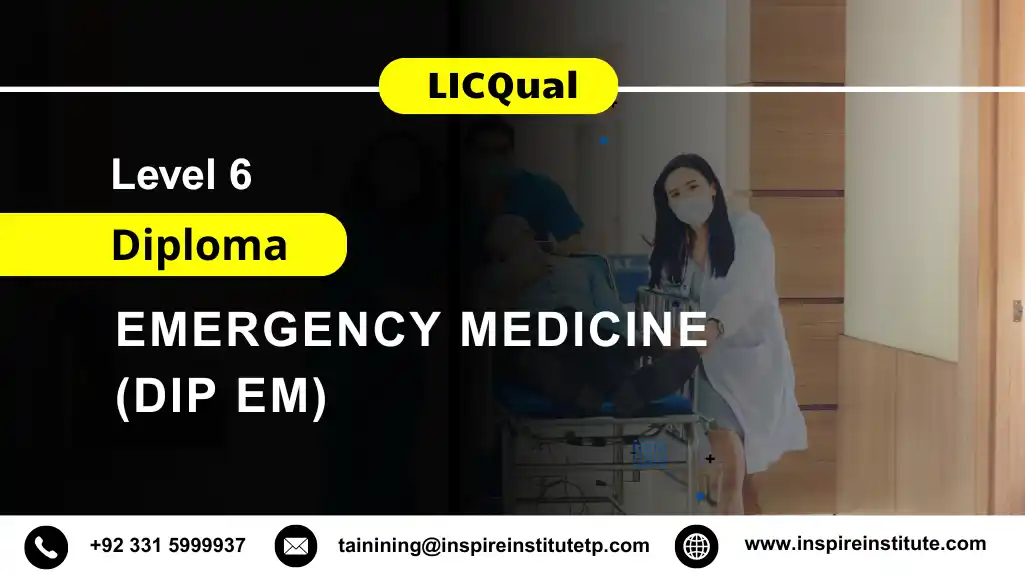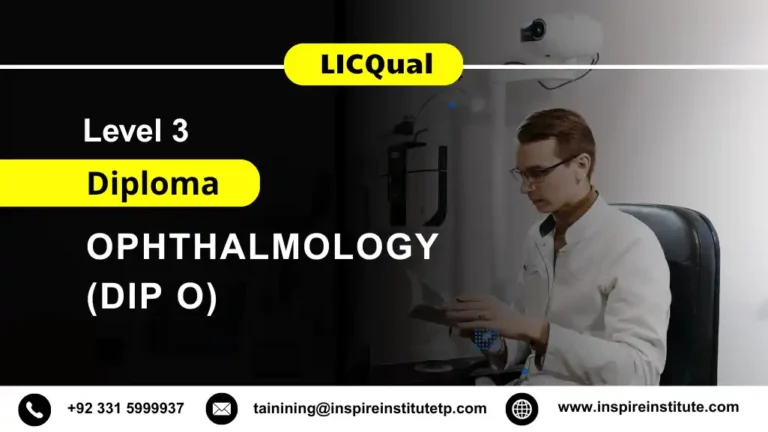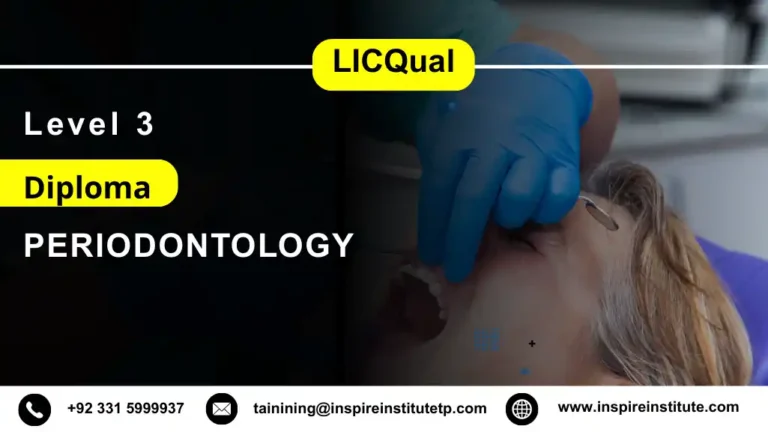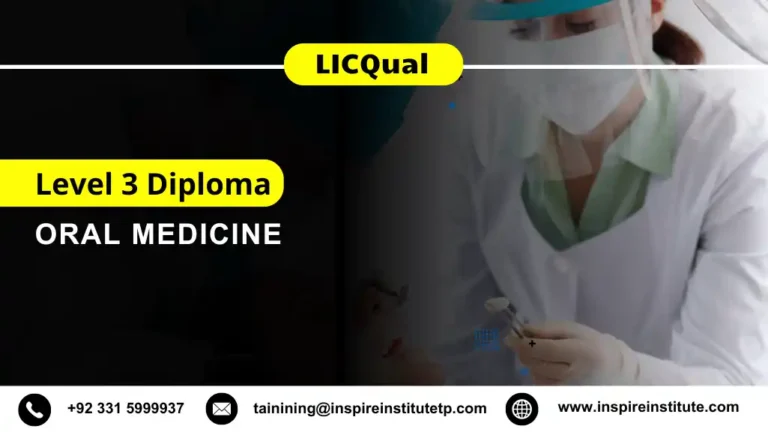LICQual Level 6 Diploma in Emergency Medicine (Dip EM)
The LICQual Level 6 Diploma in Emergency Medicine (Dip EM) is a UK-accredited qualification designed for healthcare professionals, paramedics, and medical practitioners seeking to advance their expertise in urgent and critical care settings. Emergency medicine is a rapidly evolving field, requiring precise clinical skills, quick decision-making, and the ability to manage high-pressure situations effectively. This diploma equips learners with the knowledge and practical competencies necessary to respond to life-threatening medical emergencies with confidence and professionalism.
This programme offers a comprehensive curriculum covering trauma care, acute medical management, resuscitation techniques, and critical decision-making processes. Learners gain insights into emergency protocols, patient triage, advanced life support, and the management of complex multi-system injuries. By combining theoretical foundations with real-world applications, the course ensures that participants can apply evidence-based strategies effectively in high-stakes clinical environments.
Participants will develop specialist knowledge in areas such as emergency diagnostics, rapid assessment methods, pharmacological interventions, and ethical considerations in emergency care. The course emphasizes clinical reasoning, risk assessment, and the integration of modern medical technologies to enhance patient outcomes. Learners also explore key emergency medicine frameworks and guidelines to ensure adherence to international healthcare standards.
Why Choose this Qualification
The LICQual Level 6 Diploma in Emergency Medicine (Dip EM) is a UK-accredited, assignment-based qualification designed for healthcare professionals, paramedics, and medical practitioners seeking to enhance their expertise in emergency and critical care. This diploma integrates advanced theoretical knowledge with practical applications, enabling learners to respond effectively to high-pressure medical situations. By choosing this qualification, learners gain specialist skills, clinical competence, and professional credibility that can elevate their careers in emergency medicine and healthcare leadership.
Key Reasons to Choose this Qualification
Specialist Knowledge
- Gain a comprehensive understanding of emergency medicine principles, including trauma care, acute medical management, and resuscitation techniques.
- Learn the latest clinical guidelines, protocols, and evidence-based practices for managing critical and life-threatening conditions.
- Explore emergency diagnostics, rapid patient assessment, and pharmacological interventions for urgent care.
- Understand ethical considerations, risk assessment, and decision-making processes in high-pressure medical environments.
- Develop competence in integrating technology and modern medical equipment in emergency treatment.
Practical Application
- Apply clinical knowledge in real-world scenarios through case studies, simulations, and scenario-based learning.
- Acquire hands-on skills in patient stabilization, emergency procedures, and life support techniques.
- Strengthen decision-making under pressure for trauma, cardiac arrest, respiratory distress, and mass casualty events.
- Collaborate effectively within multidisciplinary emergency response teams.
- Translate theoretical concepts into safe, evidence-based patient care in critical situations.
Recognised Qualification
- Earn a UK-accredited diploma that validates advanced expertise in emergency medicine.
- Gain a qualification recognized internationally for clinical and academic credibility.
- Enhance employability across hospitals, emergency departments, ambulance services, and pre-hospital care.
- Demonstrate measurable professional competence and adherence to global healthcare standards.
- Serve as a stepping-stone for advanced postgraduate studies or specialist emergency roles.
Flexible Learning Pathway
- Study through an assignment-based programme suitable for working healthcare professionals.
- Progress at your own pace without disrupting clinical responsibilities.
- Access structured academic support, digital resources, and tutor guidance throughout the course.
- Balance professional development with ongoing patient care and workplace duties.
- Ensure consistent learning outcomes while managing personal and professional commitments.
Evidence-Based Training
- Explore the latest research, emergency care protocols, and clinical innovations.
- Learn to critically evaluate medical literature and implement evidence-based strategies.
- Stay updated on current life support techniques, trauma management, and acute care interventions.
- Apply modern diagnostic frameworks and patient-centered emergency protocols.
- Ensure safe, effective, and scientifically validated care in high-stress medical scenarios.
Career Development
- Expand professional opportunities in hospitals, emergency departments, pre-hospital services, and teaching institutions.
- Qualify for roles such as Emergency Medicine Specialist, Clinical Instructor, or Advanced Paramedic.
- Build a professional portfolio that supports leadership, advanced practice, and academic contributions.
- Gain measurable competencies that enhance eligibility for promotion and specialist recognition.
- Open pathways for international career mobility in emergency and critical care medicine.
Enhanced Patient Care
- Deliver high-quality, patient-centered care during urgent and critical medical situations.
- Improve patient outcomes through rapid assessment, early intervention, and life-saving procedures.
- Develop expertise in trauma care, critical decision-making, and multidisciplinary coordination.
- Foster compassionate, ethical, and culturally sensitive emergency care practices.
- Contribute to improved survival rates, recovery, and overall patient well-being.
Professional Growth
- Strengthen leadership, communication, and teamwork skills within emergency care settings.
- Enhance critical thinking, analytical reasoning, and clinical judgment under pressure.
- Build confidence in managing complex emergency cases with precision and professionalism.
- Encourage reflective practice, continuous learning, and professional accountability.
- Prepare to meet the growing demand for highly skilled emergency medicine practitioners worldwide.
The LICQual Level 6 Diploma in Emergency Medicine (Dip EM) equips healthcare professionals with specialist knowledge, practical skills, and an internationally recognised qualification. By completing this programme, learners enhance patient outcomes, accelerate career growth, and contribute significantly to excellence in emergency and critical care medicine.
Course Overview
LICQual UK Awarding Body
Average Completion Time:
6-24 Months
Study Units: 6 Units
Evidence & Assignment Based
Mandatory Units
Who Should Take This Course
The LICQual Level 6 Diploma in Emergency Medicine (Dip EM) is designed for healthcare professionals, paramedics, and medical practitioners seeking to enhance their expertise in emergency and critical care. This qualification is ideal for individuals who aim to strengthen clinical competencies, improve patient outcomes, and advance their careers in high-pressure medical environments. The programme provides practical skills, specialist knowledge, and internationally recognized credentials, ensuring learners are equipped to excel in emergency medicine settings worldwide.
This course is suitable for
Medical Practitioners
- Enhance clinical skills in diagnosing and managing acute medical emergencies.
- Develop competence in trauma care, resuscitation, and critical decision-making.
- Apply advanced medical protocols and evidence-based interventions in emergency situations.
- Gain skills for working efficiently within multidisciplinary emergency teams.
- Prepare for leadership or specialist roles in hospital emergency departments.
Paramedics and Pre-Hospital Care Professionals
- Strengthen expertise in pre-hospital emergency interventions and life-saving techniques.
- Learn to conduct rapid patient assessments and prioritize treatment in critical scenarios.
- Develop advanced knowledge of trauma management and acute care procedures.
- Apply evidence-based protocols in ambulance services and emergency response units.
- Enhance professional credibility and eligibility for career progression in pre-hospital care.
Nurses and Critical Care Specialists
- Expand knowledge in emergency medicine and critical care best practices.
- Gain skills in advanced patient assessment, monitoring, and intervention.
- Learn to manage high-pressure clinical environments with confidence.
- Develop proficiency in coordinating with doctors, paramedics, and allied health professionals.
- Prepare for roles in emergency departments, trauma units, and intensive care settings.
Healthcare Educators and Trainers
- Acquire specialist knowledge to teach emergency medicine concepts effectively.
- Design evidence-based training modules for medical and paramedical staff.
- Enhance understanding of modern emergency protocols, case management, and life support.
- Develop the ability to mentor and assess clinical competencies in learners.
- Advance careers in academic or professional training institutions.
Emergency Response Coordinators
- Learn to manage medical emergencies in community, industrial, or disaster scenarios.
- Develop skills in planning, resource allocation, and crisis management.
- Gain competence in implementing emergency protocols for diverse populations.
- Understand legal, ethical, and safety standards in emergency response operations.
- Prepare for leadership roles in emergency preparedness and response teams.
Medical Students Seeking Specialization
- Build foundational expertise in emergency medicine and acute care.
- Gain early exposure to practical techniques, case analysis, and patient management.
- Develop critical thinking and rapid decision-making skills under supervision.
- Enhance readiness for postgraduate studies or specialist emergency medicine training.
- Strengthen employability and career prospects in high-demand medical fields.
Allied Health Professionals
- Expand knowledge in emergency interventions relevant to physiotherapy, occupational therapy, or radiology.
- Learn collaborative strategies for effective emergency care delivery.
- Gain practical skills to support patient stabilization and treatment in acute settings.
- Understand emergency protocols, patient safety measures, and ethical standards.
- Contribute to improving patient outcomes in multidisciplinary medical teams.
International Healthcare Professionals
- Adapt advanced emergency medicine skills to diverse healthcare systems globally.
- Learn internationally recognized emergency protocols and evidence-based practices.
- Strengthen career mobility and eligibility for global emergency medicine roles.
- Gain insights into cross-cultural patient care and communication in critical situations.
- Develop specialist expertise recognized by healthcare institutions worldwide.
The LICQual Level 6 Diploma in Emergency Medicine (Dip EM) is ideal for healthcare practitioners seeking to enhance clinical skills, leadership abilities, and specialist knowledge in emergency and critical care. By enrolling in this programme, learners gain practical competence, career advancement opportunities, and the confidence to deliver high-quality emergency care in a variety of healthcare settings.ion in psychiatry. By combining theoretical depth with practical relevance, this qualification prepares learners to deliver compassionate, evidence-based care and to contribute meaningfully to the advancement of mental health on both national and global levels.
Course Benefits
The LICQual Level 6 Diploma in Emergency Medicine (Dip EM) is a UK-accredited qualification designed for healthcare professionals, paramedics, and emergency care practitioners seeking to enhance their knowledge and clinical competencies in critical care and emergency medicine. This comprehensive, assignment-based diploma combines advanced theoretical understanding with practical applications, enabling learners to assess, manage, and treat a wide range of acute medical conditions with confidence and precision. Through evidence-based learning and flexible study pathways, this qualification prepares professionals to meet the growing global demand for skilled emergency medicine specialists.
Key Benefits of the Course
- Specialist Knowledge:
Gain an in-depth understanding of emergency medicine principles, trauma care, critical care management, and acute disease pathways. Learners explore topics such as cardiovascular emergencies, respiratory crises, sepsis management, and multi-system trauma. The course also covers emergency assessment protocols, resuscitation procedures, and advanced life support techniques, equipping learners to deliver high-quality, evidence-based emergency care. - Practical Application:
Develop hands-on competence in patient triage, acute intervention, and emergency treatment planning. Through real-world case studies and clinical simulations, learners enhance their ability to respond to life-threatening scenarios, perform rapid assessments, and apply clinical decision-making frameworks effectively. The programme ensures proficiency in working collaboratively within multidisciplinary emergency teams to optimise patient outcomes. - Recognised Qualification:
Earn a prestigious UK-accredited diploma that validates professional expertise in emergency medicine and critical care. The LICQual Level 6 Diploma in Emergency Medicine (Dip EM) is recognised internationally, meeting global healthcare standards. This qualification enhances professional credibility and opens doors to career advancement in hospitals, pre-hospital care, disaster response, and academic or research roles. - Flexible Learning Pathway:
Designed with working professionals in mind, the assignment-based structure provides flexibility to study without disrupting ongoing clinical duties. Learners progress at their own pace while receiving structured academic guidance, digital learning resources, and personalised mentorship, ensuring a seamless integration of education and professional practice. - Evidence-Based Training:
Explore the latest research, clinical guidelines, and emergency medicine protocols that underpin modern acute care. The course emphasizes evidence-based strategies in resuscitation, trauma management, and emergency procedures. Learners are trained to critically evaluate scientific literature and incorporate validated practices that improve patient safety and outcomes. - Career Development:
Expand professional opportunities in emergency departments, ambulance services, trauma centres, and teaching institutions. Graduates may pursue roles such as Emergency Medicine Practitioner, Critical Care Specialist, Paramedic Leader, or Academic Lecturer in Emergency Medicine. The diploma also serves as a foundation for advanced postgraduate studies or specialisation in acute care and disaster medicine. - Enhanced Patient Care:
Learn to deliver rapid, safe, and ethical emergency medical care. The programme develops expertise in managing acute medical crises, fostering patient trust, and improving survival and recovery outcomes. Learners gain the ability to provide holistic emergency care, addressing medical, psychological, and social needs effectively. - Professional Growth:
Strengthen critical thinking, clinical judgment, and leadership skills essential for high-pressure medical environments. The diploma encourages reflective practice, teamwork, and professional accountability. Graduates emerge as confident, competent, and versatile emergency medicine professionals capable of advancing global healthcare standards.
The LICQual Level 6 Diploma in Emergency Medicine (Dip EM) empowers healthcare professionals to excel in acute care and emergency management through advanced clinical knowledge, practical expertise, and internationally recognised credentials. This qualification not only enhances career prospects but also contributes to improved patient outcomes and healthcare delivery worldwide.e improvement of mental health services and patient outcomes worldwide.
Eligibility Criteria
The LICQual Level 6 Diploma in Emergency Medicine (Dip EM) is a UK-accredited qualification designed for healthcare professionals, paramedics, and emergency care practitioners seeking to enhance their knowledge and clinical expertise in acute and emergency medical care. This assignment-based diploma integrates theoretical foundations with practical applications, preparing learners to assess, manage, and treat a wide range of medical emergencies effectively.
Educational Background:
Applicants should hold a recognised qualification in medicine, nursing, paramedicine, or a related healthcare field. A Level 5 diploma or equivalent qualification in emergency care, critical care, or healthcare management may also be accepted. Candidates with international degrees in emergency medicine or related disciplines will be evaluated individually to determine eligibility and equivalence to UK standards.
Professional Experience:
A minimum of one year of clinical experience in healthcare, emergency medicine, critical care, or a related medical setting is recommended. Previous exposure to acute care, trauma management, or patient triage provides an advantage. However, motivated applicants with a strong interest in emergency care and acute patient management, even without direct emergency experience, are encouraged to apply.
Age Requirement:
Applicants must be at least 18 years old at the time of enrolment. This ensures that learners possess the maturity, ethical understanding, and clinical responsibility required for advanced emergency medicine study and practice.
Language Proficiency:
As the programme is delivered entirely in English, learners must demonstrate proficiency in reading, writing, and communication. A minimum IELTS score of 6.0 or an equivalent qualification is recommended for non-native English speakers to ensure effective participation in assignments, discussions, and assessments.
Technical Requirements:
Learners should have access to a computer or laptop with a reliable internet connection to participate in online learning, access study materials, and submit assignments. Basic computer literacy, including proficiency in research, document preparation, and communication tools, is essential for academic success in this programme.
Required Documents:
Applicants are required to submit the following documents during registration:
A valid ID card or passport for identity verification.
Academic transcripts or certificates of previous qualifications.
Proof of professional experience in emergency medicine, healthcare, or paramedicine (if applicable).
The Qualification Process
LICQual Level 6 Diploma in Emergency Medicine (Dip EM) follows a structured pathway to ensure learners gain comprehensive knowledge, practical skills, and professional competence in community oral healthcare.
Step 1: Self-Assessment
Learners review the entry requirements to confirm eligibility. Candidates with a background in dentistry, oral health, or public health are encouraged to apply.
Step 2: Registration
Complete the registration process by submitting required documents such as proof of qualifications, a valid ID, and payment of enrollment fees.
Step 3: Induction
An induction session is conducted to:
- Verify learner eligibility and documentation.
- Introduce study materials, learning outcomes, and assessment procedures.
Step 4: Learning and Evidence Submission
Learners complete assignments, case studies, and practical exercises demonstrating competence in public health dentistry, community oral health assessment, preventive strategies, and program planning.
Step 5: Feedback and Revision
Assessors review submitted evidence and provide constructive feedback. Learners can revise and resubmit work to meet all required standards.
Step 6: Competence Validation
Final submissions are evaluated to confirm that learners have met all theoretical and practical learning outcomes.
Step 7: Internal Quality Assurance (IQA)
The IQA team reviews the assessment process to ensure accuracy, fairness, and compliance with international standards.
Step 8: External Verification (EQA)
External verifiers validate the authenticity and quality of learner achievements.
Step 9: Certification
Upon successful verification, learners are awarded LICQual Level 6 Diploma in Emergency Medicine (Dip EM), demonstrating advanced proficiency in community oral healthcare and preparing them for professional growth in dental public health, preventive dentistry, and healthcare policy.







